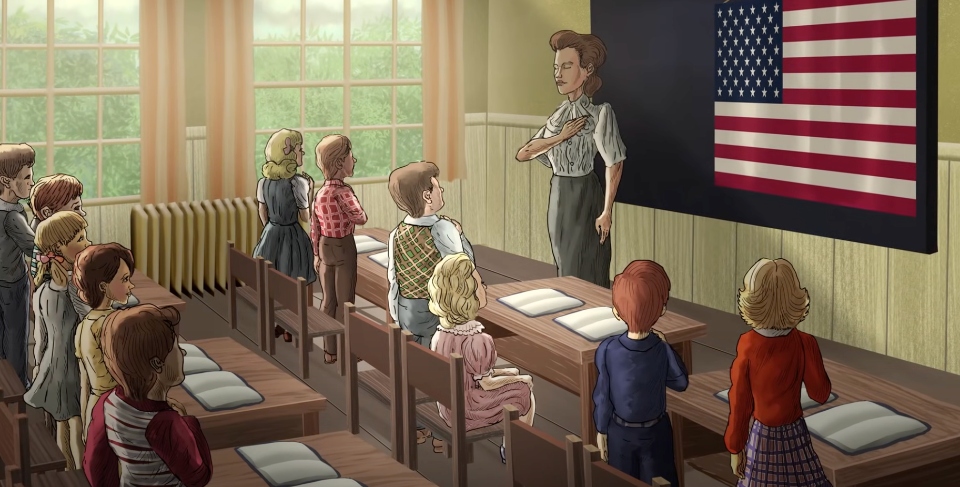This is the first installment of Law Matters, our new Q&A format story series bringing Jelani Jefferson Exum, the Law School’s Dean and Rose DiMartino and Karen Sue Smith Professor of Law, into conversation with our full-time faculty about their legal scholarship and other activities and achievements in the field.
In January, the Law School’s Denise ‘90 and Michael ‘91 Mattone Center for Law and Religion launched a YouTube channel that features a new animated video series, Landmark Cases in Religious Freedom. Each episode in the series examines a pivotal court decision on the relationship between law and religion. In addition to providing historical context, the videos explain key legal arguments and analyze the broader societal impact of these major cases. Here, St. John’s Law Dean Jelani Jefferson Exum talks to Professor Mark Movsesian, the Center’s Director, about this innovative project.
JJE: The videos are wonderful and have about 300,000 views so far. Why did you decide to produce this kind of original social media content?
MM: Since its founding more than a decade ago, the Mattone Center has sponsored traditional legal scholarship, including academic conferences and law review pieces. I had been thinking about how we could reach a broader audience and expand the Center’s impact. We already have a podcast series, Legal Spirits, which is doing quite well, and I’ve recorded animated videos on legal topics for other YouTube channels. So I thought, why not sponsor our own series on landmark cases in religious freedom, which seemed a natural fit. I have to say, this has been a fun project. It’s definitely not something that law professors are trained to do. But working on the scripts and sharing ideas with the animator has been very satisfying. And it’s great to see the viewership climb as each episode is released.
JJE: In its first season, the series explores People v. Phillips (1813), Reynolds v. United States (1878), Cantwell v. Connecticut (1940), West Virginia State Board of Education v. Barnette (1943), and Everson v. Board of Education (1947). What made those cases stand out for you?
MM: All are foundational decisions that continue to influence U.S. law. For me, the most interesting thing is how the issues presented in these five cases appear over and over in U.S. history. For example, Phillips (the only non-Supreme Court decision covered in the series) is about requiring Catholic priests to reveal what they learn in confession—the subject of a Washington State law enacted just this year. Reynolds concerns restrictions on polygamy. Cantwell involves prohibitions on anti-religious “hate speech” that upsets listeners. Everson involves state financial assistance that makes its way to religious schools. And Barnette, the flag salute case, is about compelling people to speak in ways that violate their religious convictions—which is the issue in the recent wedding vendor cases. These questions continue to perplex law professors, students, lawyers, judges, and U.S. citizens generally. They are perennial problems. There is no new thing under the sun.
JJE: YouTube is a primary source of news and information for millions of people around the world. How does the video series serve the Center’s mission of fostering awareness of, and dialogue around, the interplay of law and religion?
MM: During office hours last semester, a couple of my students told me that they and their classmates routinely go on YouTube for information about cases they’re reading for class. The difficult thing, they said, is finding reliable information. Our videos are reliable. I present the cases as objectively as I can. I explore arguments on both sides, explain the Court’s rulings, and leave it to viewers to decide for themselves what the right outcome should have been. For what it’s worth, my own view is that these cases usually don’t admit of easy answers. Church-and-state issues are very often hard, requiring judgment and the balancing of competing, legitimate values. But even if you have a very clear sense of where you come down in these cases, I think the videos will be useful as a guide to the issues involved.
JJE: The series’ second season is set to launch this fall. Can you give us a preview?
MM: Sure. The next season of the series will cover mid-20th century cases on church autonomy and the compelling interest test, before moving on to more recent decisions. The Court has greatly transformed its religion clause jurisprudence in the last dozen years or so, and I need to save space for current cases. In fact, that’s been the only frustrating thing about this project. There are so many important decisions to discuss that it’s very hard to choose among them!

